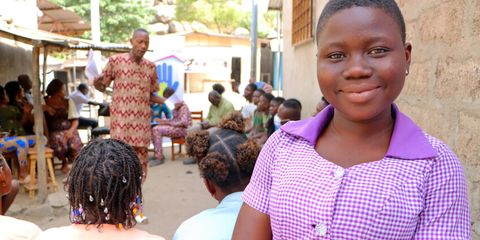22 MARCH 2019
Brazil has passed a law banning the marriage of children under 16 following a two year long campaign by politicians and NGOs including Plan International.
The law change, approved on March 13 by Brazilian President Jair Bolsonaro after being passed in Brazil’s National Congress and Senate, prohibits anyone from marrying children below the age of 16 under any circumstances.
While 18 years is the officially the minimum age of marriage in Brazil, under the Civil Code 2002, minors under the age of 16 were until now able to be married off if they were pregnant or if they had older sexual partner seeking to avoid a criminal sentence for statutory rape.
The change comes after Plan International launched a petition which attracted almost 12,000 signatures calling for the civil code to be amended to better protect girls in these circumstances.
Millions of Brazilian girls affected
The minimum legal age of marriage should be set at 18 for both men and women, regardless of the circumstances.
Cynthia Betti, National Director for Plan International in Brazil welcomed the announcement, saying “The decision to ban child marriage for under 16s is a hugely important step forward in the fight for girls’ rights. Child marriage is a deeply harmful practice that we know affects the lives of millions of girls here in Brazil and we have campaigned long and hard to achieve the outcome announced today.”
However, children who are 16 or 17 years old can still marry with the consent of their parents or legal representatives.
“There is still much to do,” said Betti. “In line with international human rights law, Plan International strongly believes that the minimum legal age of marriage should be set at 18 for both men and women, regardless of the circumstances. We must now redouble our efforts to raise awareness of the damage marrying off girls under the age of 18 does to their lives in the communities where we work.”
Highest number of child brides worldwide
According to Unicef, Brazil has the fourth highest number of child brides in the world, 3,034,000. According to the most recently available data, 36% of Brazilian girls are married before their 18th birthday and 11% are married before the age of 15.
In 2015, Plan International, Brazil’s Federal University of Para and the gender equality NGO Promundo collaborated of a first of its kind study into child marriage in Brazil called “Ela vai no Meu Barco” (“She goes with me in my boat”).
The report shone light on how widespread and accepted child marriage is within Brazilian society and debunked the popular misconception that the practice is only common in rural areas. These findings played a key role in bringing about the change in the law that was announced last week.
Married girls robbed of their rights
Viviana Santiago, Gender and Political Advocacy Manager at Plan International Brazil, said “Child marriage impacts on girls’ lives in a multitude of detrimental ways. It robs them not only of their rights, but also of their childhoods. A girl who is married before the age of 18 is more likely to drop out of school, to become a mother, to die due to complications during pregnancy and childbirth and to be trapped in a lifetime of poverty. Her hopes and dreams are limited by this practice and she is also more likely to face domestic and sexual violence.”
It is a violation of a girl’s fundamental human rights to health, education, wellbeing and opportunity.
“All of these things have a deep effect on girls’ mental as well as physical health and their possibilities of economic autonomy and their ability to make decisions about their own bodies are taken away from them. It is therefore a violation of a girl’s fundamental human rights to health, education, wellbeing and opportunity and there are absolutely no circumstances under which it should be acceptable.”
“We are therefore calling for the Brazilian government to close the loophole which allows 16 and 17 year olds to be married with parental consent so that we can properly protect girls, eradicate this practice and enable them to take control of their lives and their futures.”


